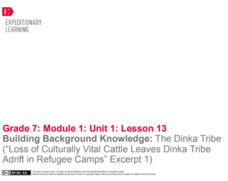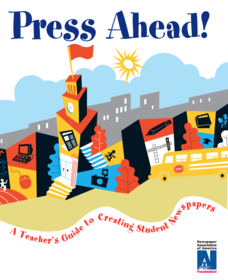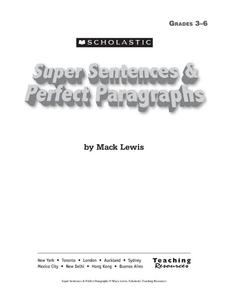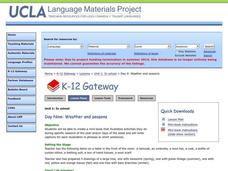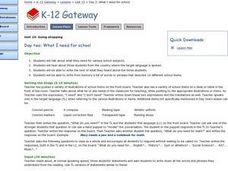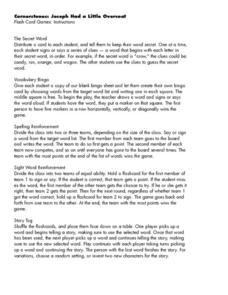EngageNY
Building Background Knowledge: The Dinka Tribe (“Loss of Culturally Vital Cattle Leaves Dinka Tribe Adrift in Refugee Camps” Excerpt 1)
Text annotations help readers track essential ideas. Pupils continue reading and annotating an informational article about Sudanese tribes, connecting it with A Long Walk to Water by Linda Sue Park. They also begin writing about their...
Newspaper Association of America
Press Ahead!
Give class members some great news! A media unit teaches individuals about ethics, parts of a newspaper, business writing, photojournalism, and more topics that have to do with the press. Full of material for a variety of learners,...
EngageNY
Writing to Show, Not Tell: Dialogue, Sensory Words, and Strong Action Verbs
Consume, gobble, devour ... serving up strong verbs! Writers focus on using dialogue, strong action verbs, and sensory details in their writing. After analyzing a model narrative, they apply their learning to their own hero's journey...
Super Teacher Worksheets
Idioms
If figurative language makes your kids feel blue or under the weather, use an activity focused on idioms to help them feel on top of the world. Kids complete a chart with seven idiomatic phrases, adding the meaning of each along with an...
Ms. Effie's Lifesavers
Ralph Ellison’s Invisible Man in the Spotlight
Ralph Ellison's Invisible Man is the most frequently cited novel for the Advanced Placement Literature and Composition Open Response Question. Those new to using the book and and veterans as well will find the teaching strategies, the...
Texas Education Agency (TEA)
How to Read and Analyze a Poem (English III Reading)
A poem is compressed speech, like a can of frozen juice with all the water pressed out. An interactive teaches users how to reconstitute the language, the structure, and the literary devices to appreciate all the subtleties the poet...
Scholastic
Super Sentences & Perfect Paragraphs
An extensive collection of lessons and activities includes many writing, grammar, and proofreading exercises. With templates and worksheets that cover several steps in the writing process, from sentence to paragraph to essay, this...
Madison Public Schools
Journalism
Whether you are teaching a newspaper unit in language arts, covering the First Amendment and censorship in social studies, or focusing on writing ethics in journalism, a unit based on the foundations of journalism would be an excellent...
Roald Dahl
Charlie and the Chocolate Factory
You can't read Roald Dahl's Charlie and the Chocolate Factory without craving the rich treats described in Dahl's vivid prose. Young writers try their hands at sensory language with a lesson plan that prompts them to write about their...
Curated OER
Teach Text Features & Read Nonfiction
Elementary schoolers examine the components of reading nonfiction. They use think-alouds to help them complete reading the selected sections. They also identify text features as they read.
Scholastic
Folk and Fairy Tale Readers: The Little Red Hen
Engage young learners in reading classic folk tales with this printable version of The Little Red Hen. The simple language and repetitive structure of the story make it perfect for children working on developing their fluency. Two...
Digital Public Library of America
Teaching Guide: Exploring Little Women
Louisa May Alcott's Little Women is a literary masterpiece as well as a timestamp of the formative mid-nineteenth century in America. Using a primary source set of photographs, letters, and portraits, readers discuss the ways...
Curated OER
Figurative Language in Toni Morrison's "A Mercy"
In order to read and respond to Toni Morrison's A Mercy in this figurative-language instructional activity, students discuss the differences between a literal and a figurative interpretation of a text. They explore figures of speech...
Read Write Think
Poetry Portfolios: Using Poetry to Teach Reading
Over the course of five periods, scholars create a poetry portfolio. They begin with a reading of the poem, Firefly. With a focus on vocabulary, learners reread the poem then look for sight words and other skills.
Achieve3000
Discriminating Phonemes 2
Some sounds sound very similar! Help your class learn how to distinguish between various sounds by following the steps outlined in this plan. The plan includes a warm-up, a teacher-led portion, and details for guided and independent...
Shmoop
ELA.CCSS.ELA-Literacy.W.9-10.6
Make the move toward incorporating more technology in your classroom and help to prepare your class for the professional world. Here is a resource that describes the Common Core standard while incorporating technology and English...
Scholastic
Quick as a Cricket Lesson Plan
Teaching young learners about similes is easy as pie with this primary grade language arts lesson. Following a class reading of the children's book, Quick as a Cricket by Audrey Wood, young readers learn the definition of a simile as...
EngageNY
Advocating Persuasively in a Fishbowl: Practice
What makes a good advocate? An informative lesson plan teaches class members how to advocate persuasively. They participate in a fishbowl activity and listen to the teacher model advocating persuasively. They then practice independently,...
Curated OER
Teaching Julius Caesar: A Differentiated Approach
While the themes of Julius Caesar may appeal to most readers, the act of reading the play can be a challenge. A unit plan related to the popular play by Shakespeare provides lesson plans and activities designed for differentiated...
Curated OER
Weather and Seasons
Use pictures and manipulatives to develop vocabulary with your beginning language learners. This plan can be used with foreign language learners (although you'll have to provide the vocabulary), English language learners, or a young...
Curated OER
What I need for School
You can use this lesson with English language learners, a young language arts class, or speakers of a foreign language. The phrases learned are I need and I don't need. The teacher collects several items around the room, and learners...
Lakeshore Learning
Alphabet Sounds Teaching Tubs
A hands-on activity brings the alphabet to life in your kindergarten! Fill tubs with items that begin with the same letter or end with the same sound, and let kids make the connections between the items.
George W. Bush Presidential Library and Museum
Teaching Primary and Secondary Sources
What makes a source primary or secondary? Middle schoolers read a definition of each term before exploring different examples and applying their knowledge to a research project.
PBS
Joseph Had a Little Overcoat: Flash Card Games
Expand the vocabulary of young readers with this series of five activities based the children's book Joseph Had a Little Overcoat by Simms Taback. From playing bingo to group storytelling, a variety of different approaches are presented...


